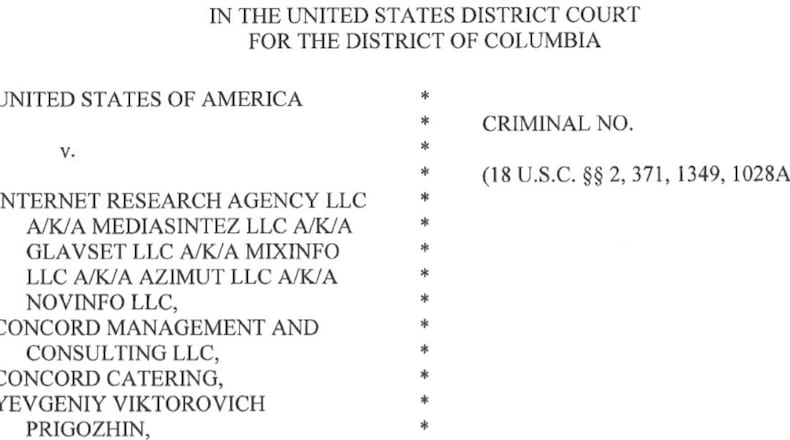The investigation into Russian interference in the 2016 election for President on Friday presented some of the first official government evidence of actions taken in the campaign, as a federal grand jury returned an indictment against 13 Russians and 3 Russian entities, alleging that they used social media to support President Donald Trump, and oppose Democratic nominee Hillary Clinton.
Here is some of what we learned on Friday:
1. Russian interference no longer a "hoax." For months, President Trump has complained that the Russia investigation is a hoax. But now, the feds have laid out a highly detailed indictment, alleging that 13 Russians and 3 different Russian entities used social media to buy political ads against Hillary Clinton ("Ohio Wants Hillary 4 Prison"), and for Donald Trump ("Trump is our only hope for a better future!"), organized actual rallies to support Mr. Trump ("Florida Goes Trump"), and much more. "If you had any doubt that Russia meddled in our 2016 elections, this is your wake-up call," said Sen. Tom Carper (D-DE). " "There is no question that Russia meddled in our 2016 elections," said Sen. James Lankford (R-OK). Back in September, the President derided the idea that Russian groups had bought social media ads in the 2016 campaign. "The Russia hoax continues, now it's ads on Facebook ," he tweeted. But Friday, the President seemed to finally accept that there had been Russian interference.
2. Rosenstein takes the lead on new indictments. While Deputy U.S. Attorney General Rod Rosenstein is officially the boss of Special Counsel Robert Mueller, Rosenstein has not participated in any of the earlier indictment or guilty plea announcements. But today, the 'DAG' was front and center at the Justice Department. He laid out the basics of the indictments of 13 Russians and described the outlines of the effort to meddle in the 2016 election. Rosenstein took only a few questions.
3. Trump - and his supporters - proclaim "NO COLLUSION." On Twitter, and then in a statement issued by the White House on Friday afternoon, the President made clear that the latest indictments showed nothing in the way of collusion between Russians and his campaign. (The all-caps "NO COLLUSION" was in the White House statement.) But what was really said by Deputy Attorney General Rosenstein? "Now, there is no allegation - in this indictment - that any American was a knowing particpant in this illegal activity," Rosenstein said, as he used "in this indictment" several times.
4. No names revealed of who Russians contacted. As the indictment detailed efforts by the Russians to set up events for Trump supporters in Florida, there were contacts made with people on the Trump Campaign. The indictment doesn't list the names of those who were contacted by the 'joshmilton024@gmail.com' account - instead, they are referred to as "Campaign Official 1," "Campaign Official 2" and so on. But let me play devil's advocate for a minute. Why not reveal who those people were? Is it really that big of a deal?
5. Mueller reveals some of his evidence. At one point in the indictment, the feds quote an email from one of the Russians, Irina Viktorovna Kaverzina, in which she said: "We had a slight crisis here at work: the FBI busted our activity (not a joke)." While that jumps off the page of the indictment, it is also seems to send a message - that the FBI has a lot more information, from the social media accounts that were used by the Russians, to emails and more. Could some of this also be from intelligence efforts? We'll see.
6. Hillary Clinton in a cage - Russian supported? In the indictment, it talks about how the Russians moved "to build a cage large enough to hold an actress depicting (Hillary) Clinton in a prison uniform." That jogged the memory of several reporters, who found stories about such a scene in Florida, during the 2016 campaign. And others remembered the Hillary-in-a-cage routine from other states.
7. After the election, the Russians play both sides. The indictment also revealed that after the election was over - and President Trump had been declared the victor - the Russians even went into the business of anti-Trump rallies in New York and Charlotte, North Carolina. "Trump is NOT my President," was the rally in New York - while at the same time, the group was organizing an event to "support President-Elect Donald Trump."
https://cmgwsbradiojamiedupree.files.wordpress.com/2018/02/russia266.jpg
8. Another guilty plea as well for the Mueller probe. Minutes after the indictments against the 13 Russians was released, the Special Counsel also revealed a recent guilty plea, from February 2, of Richard Pinedo, from California. Pinedo was charged with "Identity Fraud," which may be related to efforts by the Russians indicted on Friday to use American identities while engaging in their work on the 2016 Presidential election. It wasn't exactly clear how Pinedo fits in, though it seems that he is the first American to be charged with directly helping the Russian operation to influence the 2016 campaign - but there is no evidence presented that he knew that was happening. Documents show Pinedo could face up to 15 years in prison.
About the Author
The Latest
Featured





